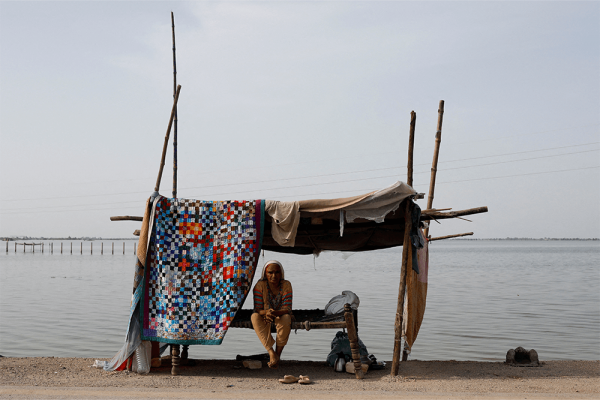Throughout August, there was an unprecedented amount of rainfall in Pakistan, with some areas of the country receiving as much as 700 percent more rainfall than normal. In the weeks since, the torrential rains have left portions of the country underwater and displaced 33 million people. Why are the people of Pakistan facing such ecological devastation? Is it simply an unfortunate act of nature?
In short: No. The causes of the flooding in Pakistan and climate-fueled catastrophes around the world are a direct result of the out-of-control consumption and production patterns of the global North — the nations in the northern hemisphere that share similar social and political distinctions like market-based economies.
Looking at emissions from a historical perspective, we see that from 1850 to 2015, the U.S. was responsible for 26 percent of the total global carbon dioxide emissions, with the nations that now make up the European Union coming in as a close second, accounting for 23 percent of total carbon emissions. Further, the U.S. hides some of its carbon emissions by offshoring its production to other countries like China. When it comes to the climate budget, the global North is deep in the red.
Whereas the global North has historically been the largest contributor to the climate crisis, a so-called “developing country” like Pakistan emits far less carbon dioxide than regions like North America, Europe, and Russia. The result: People in the global South — nations in the southern hemisphere that are newly industrialized and often former colonial subjects — are increasingly vulnerable to climate catastrophe because the global North continues to emit increasing amounts of carbon dioxide into the air.
In Reconsidering Reparations, philosopher and activist Olúfẹ́mi O. Táíwò argues that the colonial past of countries in the global South has a lot to do with their vulnerability to climate catastrophes. Táíwò explains: “It’s not that every aspect of today’s global racial empire is rooted in the impacts of climate change. But every aspect of tomorrow’s global racial empire will be. Climate change is set not just to redistribute social advantages, but to do so in a way that compounds and locks in the distributional injustices we’ve inherited from history.”
Not only do countries in the global North share the bulk of the responsibility for carbon emissions historically, but they’re also responsible for colonialist regimes, which have left many countries in the global South lacking the adequate infrastructure to deal with climate catastrophes. So, a region like Pakistan is vulnerable to climate catastrophe for two reasons: First, because of the ways the global North continues to live outside the boundaries of our planetary limits on carbon dioxide emissions of 350 parts per million; and second, due to the long history of accumulation through colonial expropriation, many countries in the global South are at a disadvantage when it comes to having the infrastructural resiliency to withstand climate catastrophes.
In Matthew 22:38-39, Jesus gives us the first and second most important commandments: We are to love God and to love our neighbors. Those in the global South are certainly our neighbors, and those of us in the global North are responsible for their suffering in a direct way both historically and currently. This biblical mandate to love our neighbors means that Christians must politicize climate change by building networks of solidarity and entering into a relationship with our neighbors in the global South; Christians must become advocates for material acts of justice and mercy.
Returning to Jesus’ words in Matthew, Christians know that we have a biblical mandate to love our neighbor. Given that the legacy of colonialism is impacting the global South generally and Pakistan more specifically, what does loving our neighbor look like in this situation? Haranguing ourselves about the evil we’re responsible for isn’t the answer.
In a recent email, Luke Stocking, who directs public engagement for Development and Peace, a Catholic social movement that builds solidarity between Christians in the global North and South, explained to me that Christians are called to a particular type of transformative vision for the world: not one that despairs about how bad things are, but one that moves toward solidarity. Quoting Pope John Paul II, Stocking wrote that we should take “the headlines of the day out of the realm of a ‘vague feeling of compassion or shallow distress’ and into the realm of Solidarity.” Solidarity rejects an individualist mindset and recognizes that we share a common cause and destiny with others who are struggling.
Huge carbon emissions may be impacting the people of Pakistan now, but they’ll inevitably hurt us in the global North as well. We’ve seen as much with the recent hurricanes in Florida, Cuba, Puerto Rico, and even massive flooding and hurricanes in coastal cities like New York City. Moving toward solidarity means politicizing climate-driven catastrophes in the global South and calling on the wealthy governments of the global North — namely the U.S., the U.K., and other countries in the European Union — to recognize their complicity by funding climate reparations.
Materially speaking, solidarity and climate reparations are two ways we can love our neighbors. For example, Catholic organizations like Caritas have created networks across the world to raise money and create solidarity for people in need. These organizations go beyond charity and toward solidarity because they recognize a common cause with marginalized people; they’re helping rather than remaining as a kind benefactor. The difference between solidarity and charity is that charity assumes the heart of a problem lies with the people they’re helping — that there’s some kind of deficit with those in need. On the other hand, solidarity is about standing with people as equals.
Climate reparations are a structural way we can love our global neighbors. The impetus for reparations is to take responsibility for the damages caused and rectify them by creating adequate structural adjustments to help the people who were originally harmed. In the case of slavery in the U.S., reparations might look like a direct cash transfer to the people who suffered and continue to suffer from the legacy of slavery.
When it comes to climate reparations, both cash transfers and overarching systemic adjustments are applicable and necessary. In the short term, countries vulnerable to climate change need money to both recover from climate disasters and build resiliency for the future. The countries that are most responsible for climate change, like the U.S., ought to be the ones contributing the most. However, simply throwing money at a problem isn’t enough to solve it. The root cause of climate change is the way those in the global North live outside the bounds of planetary limits. To take responsibility for the damage caused and work for justice requires structural shifts in the global North’s production and consumption.
It’s imperative that Christians demand that our governments and leaders take the call for solidarity and climate reparations for vulnerable countries seriously. Ignoring this call for solidarity makes it impossible for us to follow our biblical mandate to love our neighbors and makes us all active participants in systemic sin.
For those of us in the global North, our very way of life and economy is dependent upon exacerbating the climate crisis. This makes it impossible for us to love our neighbors. As the rivers of flood waters push through cities in the global South, we have to express solidarity that can match the intensity of climate change — solidarity that delivers justice like a never-failing stream!
Got something to say about what you're reading? We value your feedback!







